A group of athletic silver-haired men turn the centuries-old Temple of Heaven in Beijing into a vibrant world when they stand on head, swing around the high bar or practice Taiji.
by Wang Jiaquan, Wu Hao, He Chuhong
BEIJING, Nov. 30 (Xinhua) -- Yang Lesheng twists his shoulders like a dancing peacock while many eyes are watching at the Temple of Heaven. His movements are in sync with a song, pumping out of a mini speaker, which features the lyrics "I don't want to grow up."
Yang is 78 years young.
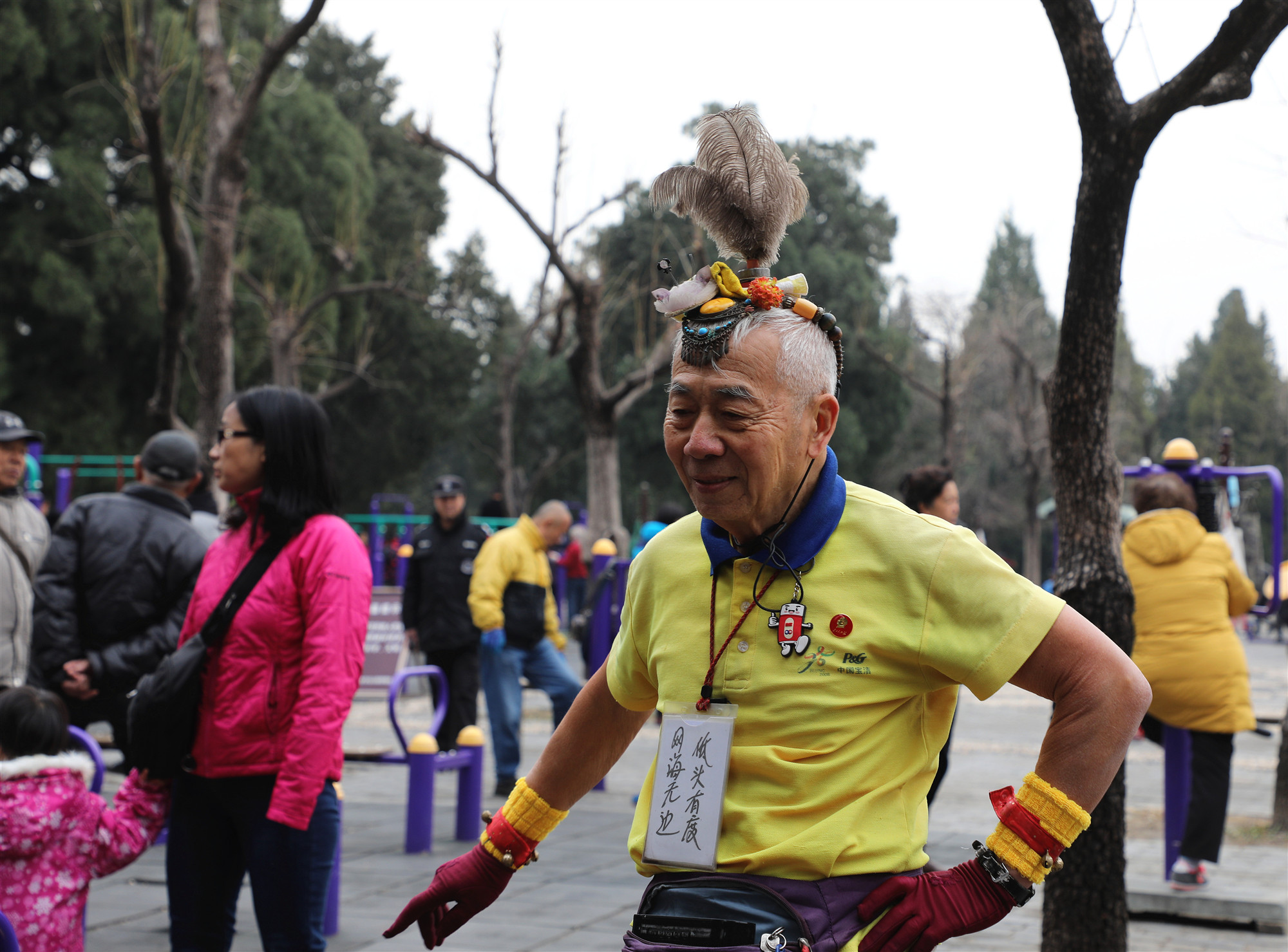 Yang Lesheng at the Temple of Heaven in Beijing, Nov. 21, 2019
Yang Lesheng at the Temple of Heaven in Beijing, Nov. 21, 2019
It is not only Yang's moves that are reminiscent of the bird of Juno. Atop his head is a weighted shuttlecock, its feathers resembling the bird's flamboyant train, as well a string of colorful beads. But this is no stage accessory.
Yang balances the feathered finery on his crown to help him keep his head raised and prevent further bending of his back. It stays firmly atop when he talks, walks, shrugs or even does push-ups. He suffers from kyphosis, a physical deformation resulting in a hunchback.
Winter has come to the north capital, but Yang is dressed in little more than short-sleeved T-shirt and slacks, while others are wrapped up in thick sweaters and heavy overcoats. This is the seventh winter that Yang has forgone cold-weather attire.
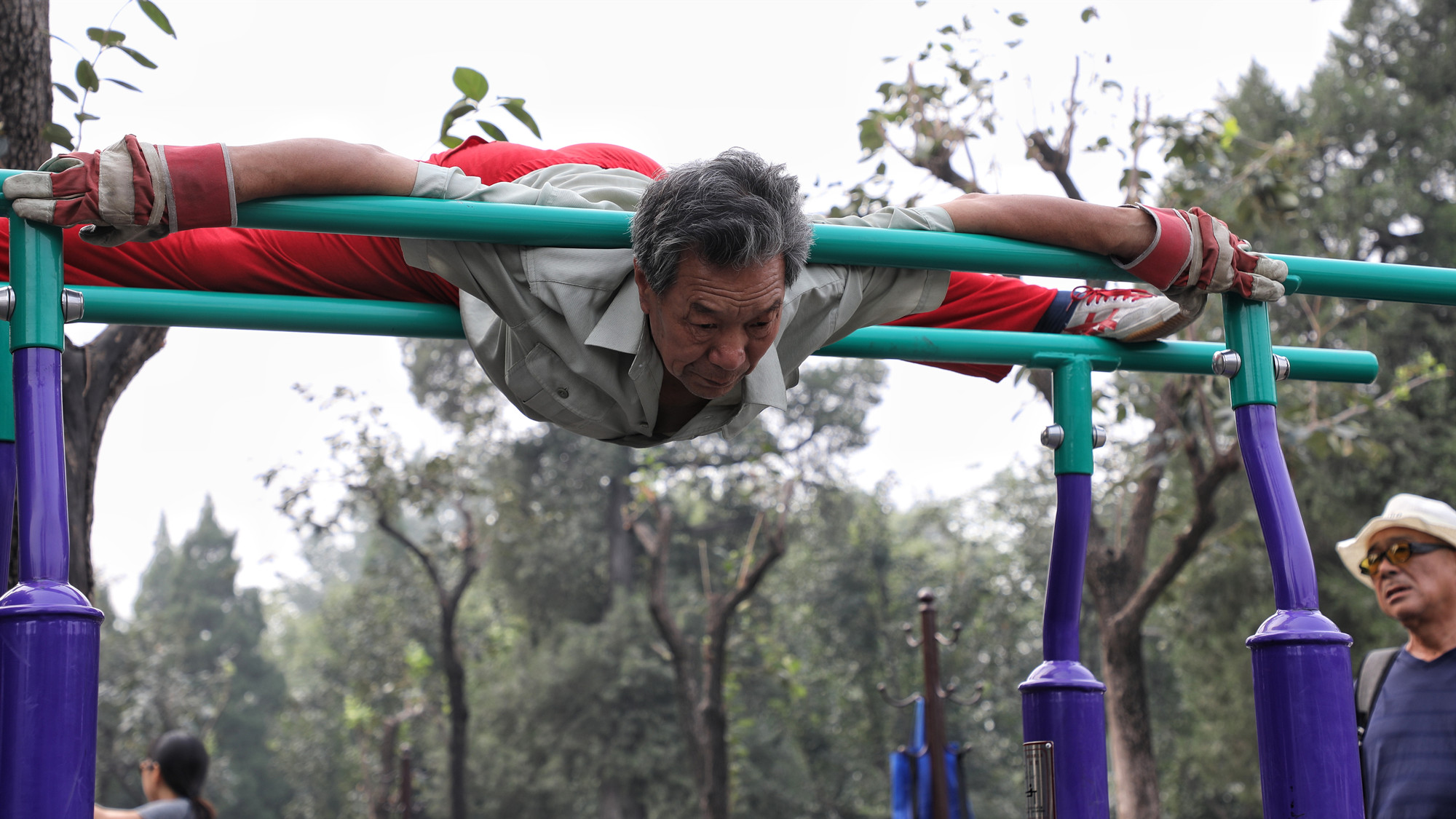 A man works out on the parallel bar at the Temple of Heaven in Beijing, Sept. 9, 2019.
A man works out on the parallel bar at the Temple of Heaven in Beijing, Sept. 9, 2019.
Yang is not alone in the Temple of Heaven, or Tiantan as it is known locally. He is just one of the many silver-haired Beijingers known as the "wild grandpas of Tiantan," whose unexpected athleticism has won much acclaim.
They can be found near the Hall of Prayer for Good Harvest. Some play "jianzi," a game like hacky sack played with a weighted shuttlecock like the one on Yang's head. Others work out on the parallel bar or practice Taiji to traditional music played through portable speakers.
Yang is a regular "wild grandpa" at the Temple of Earth near his home in the north of the city. As the Temple of Heaven is over an hour away, he picks his days carefully.
"I come here once a week, usually when it is windy in the north, as the wall surrounding the temple serve as wind breakers," Yang says.
He is not shy of camera-happy tourists, who find the wild grandpas fascinating. He faces the lens and, grin spread across his lined face, says "qie-zi," the Chinese version of "cheese," which actually translates to eggplant.
Like Yang, most people here are happy to share their experiences about keeping fit.
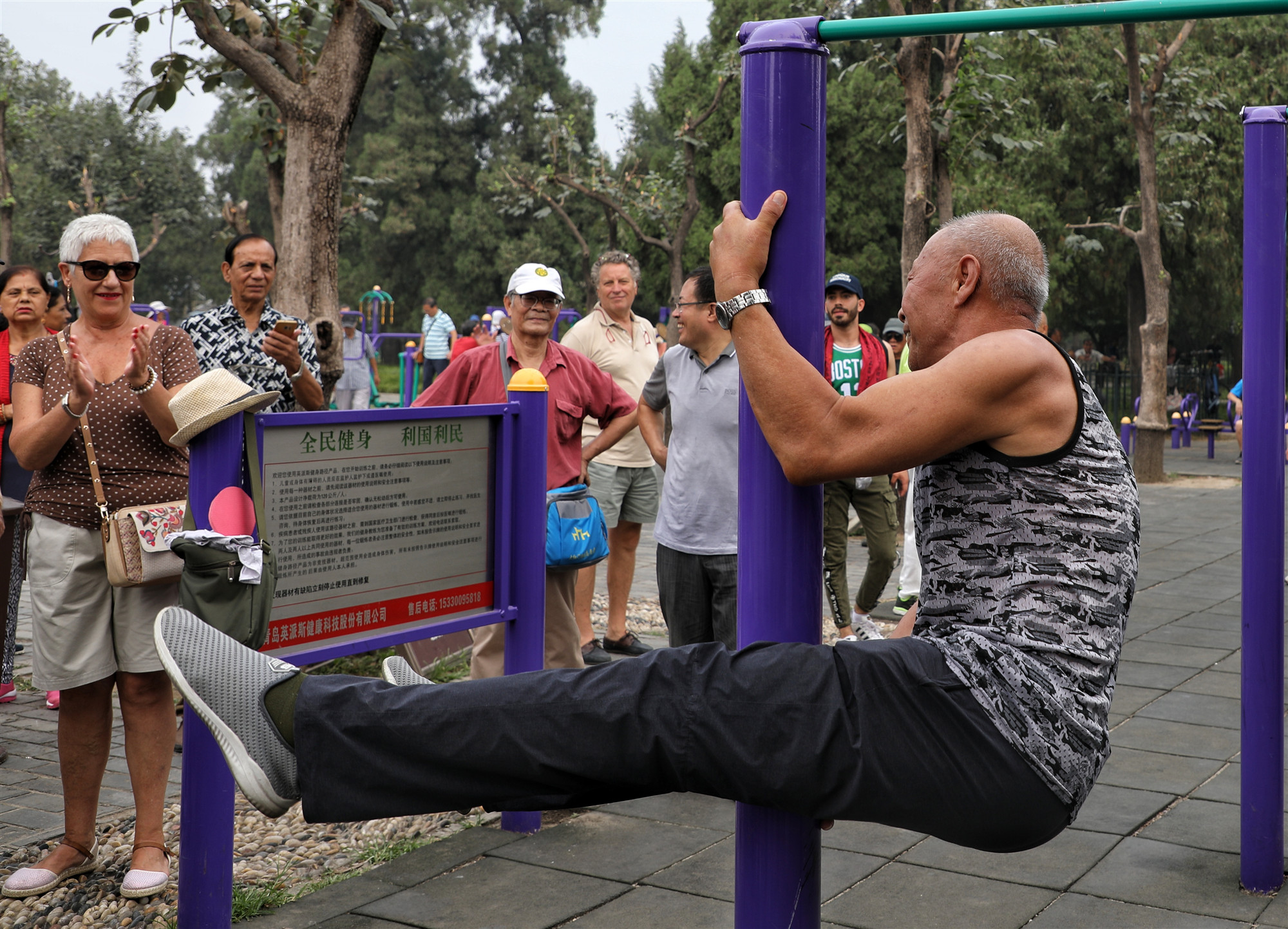 Gao Hong shows his pole acrobatics to a group of foreign tourists at the Temple of Heaven in Beijing, Sept. 9, 2019.
Gao Hong shows his pole acrobatics to a group of foreign tourists at the Temple of Heaven in Beijing, Sept. 9, 2019.
Gao Hong, 77, is excellent at headstands. He is proud of his flat stomach and laughs about the pot bellies of men half his age as he pumps his chest with tight fists to show just how muscular he is.
He can stand on his head for roughly a minute, supported by just a standing pole. He can stretch out an arm and a leg. "Nobody else can do this like me in the park," he says. "I'm the only one."
Gao began to do handstands around a decade ago. Back then, concerned about potential back injuries, he had developed an interesting way to shift heavy bags of flour up stairs - squatting like a weightlifter, slowly raising the 25-kg bag, placing it on his head, and then carrying it like that.
"Well, I thought, if my head can stand my own weight, about 75 kilograms, a sack of flour would be a piece of cake," Gao says.
 Gao Hong stands on head at the Temple of Heaven, Nov. 21, 2019.
Gao Hong stands on head at the Temple of Heaven, Nov. 21, 2019.
Ever since, he has practiced headstands every day. He usually spends four hours in the park in warm seasons and three hours when it is cold. He also does push-ups and "200 in one go" is his current personal best.
China has nearly 250 million people aged 60 years or above, many of whom exercise at parks and residential communities across the country.
While the younger generation opt for indoor gyms or pay for classes, the elderly find the simple but free facilities near their home more than sufficient. Moreover, there is the social aspect of these public spaces -- as they double up as a meeting place to swap news, and talk about their daily affairs.
The athletic men at the Temple of Heaven have a strong-online following. One recent post on WeChat, a leading social networking platform in China, says the "Tiantan grandpas" are reclusive fitness kings dwarfing young people who enjoy showing their muscles on social media.
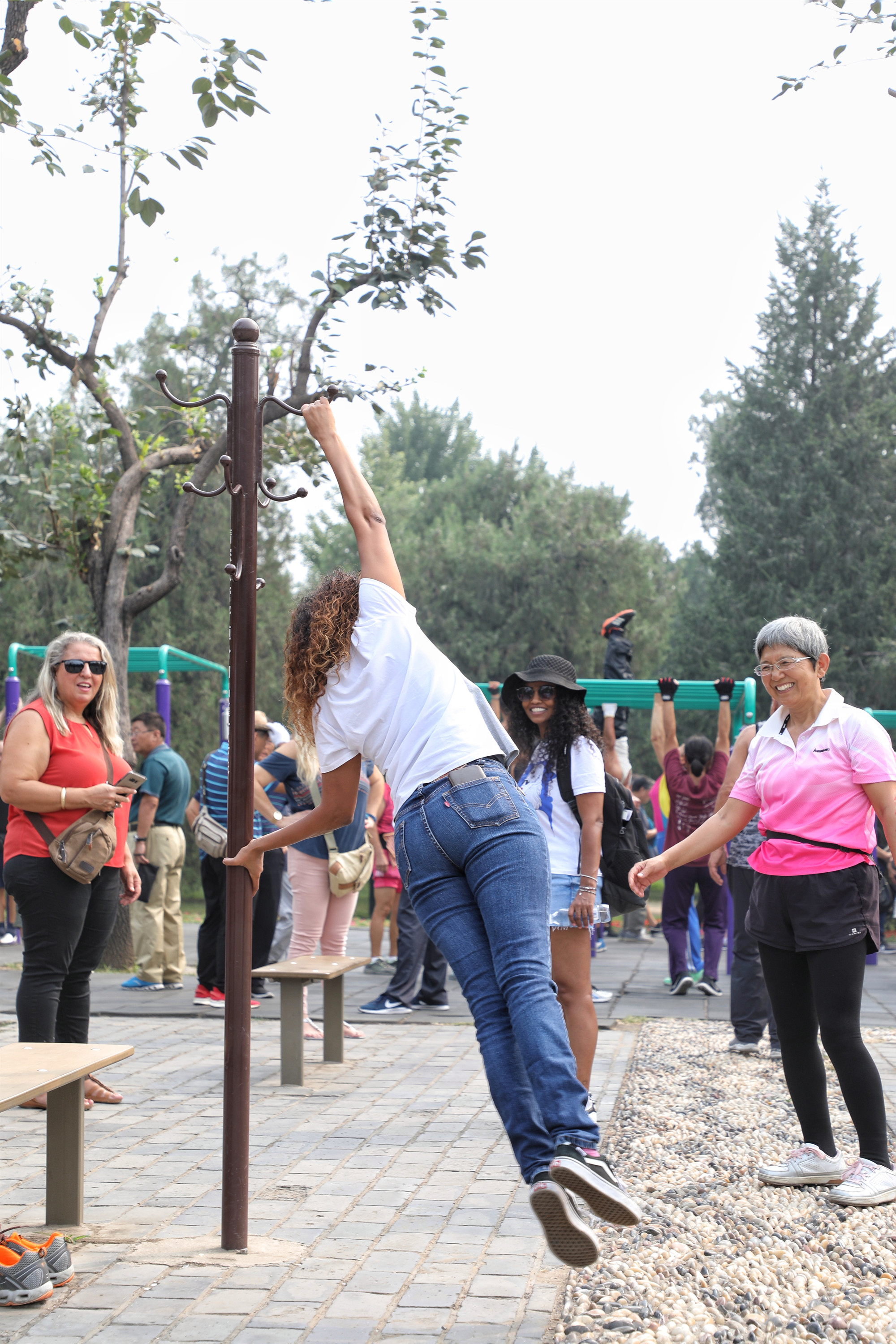 A foreign tourist tries pole acrobatics under the coaching of a Chinese woman at the Temple of Heaven, Sept. 9, 2019.
A foreign tourist tries pole acrobatics under the coaching of a Chinese woman at the Temple of Heaven, Sept. 9, 2019.
Foreign tourists, too, find the "grandpas of Tiantan" fascinating. Mark Roca, from Spain, couldn't help but compare them to senior citizens from his home country: "The elderly in Spain prefer to stay indoors."
Roca says he has been impressed by the athletic elderly people here and will share the photos he has taken.
Almost no people exercising here would refuse a photograph by or with a tourist. If they like, tourists can try the equipment, and the regulars would happily offer coaching.
Digital immigrants as they are, some social media-savvy "wild grandpas" have learned to use their smart phones for communication beyond the walls of the ancient temple, like Fawang, a user of the Chinese version of Tik Tok, who shares his high-bar skills.
With his smart phone positioned ready to live stream, Fawang swings around the bar and after a squat jumps off -- from a height of about two meters.
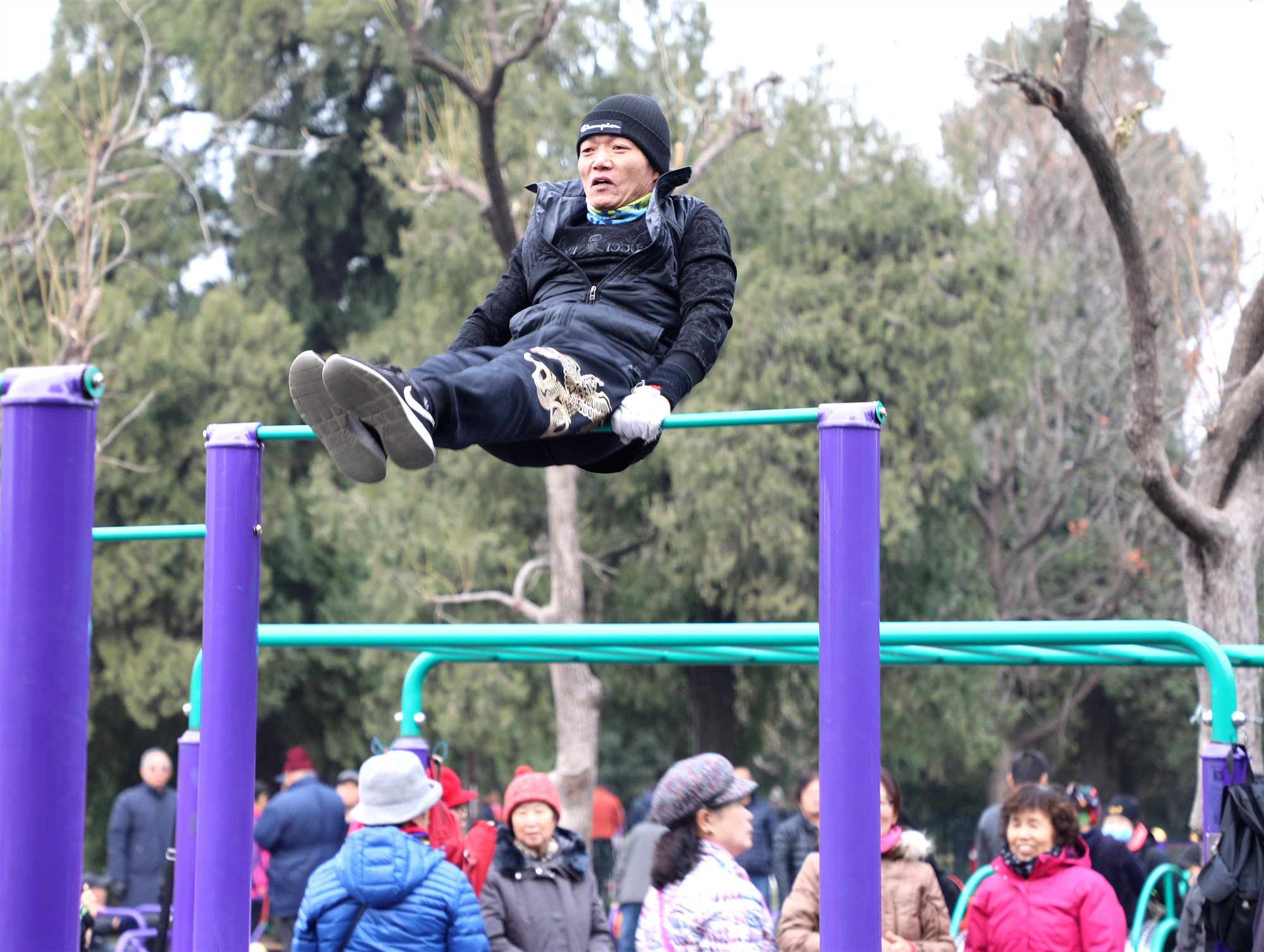 Fawang on the high bar at the Temple of Heaven, Nov. 21, 2019
Fawang on the high bar at the Temple of Heaven, Nov. 21, 2019
Gray, thin hair hidden under a cap, the man looks at least ten years younger than his actual age--64.
He has been practicing on the high bar for three or four years, but didn't get it for the giant swing until this year. "But at the Temple of Heaven, you don't have to worry about where to learn the skills as there are always masters here from whom you can learn," the man says.
Fawang comes here by bus every day from the east of the city, an hour's bus trip, and goes back to work before 11 o'clock.
He has more than 30,000 followers on Tik Tok and his live streams have over 500,000 views.
He says that live streaming might not make him money but he enjoys it. It gives him access to other masters and allows him to share his pains and gains.
"Being healthy is more important than anything else. I live stream because I want more people to follow a healthy lifestyle," says the man who "used to suffer from various ailments but has now got much better." (Photos by Wang Jiaquan; Video by He Chuhong) ■



